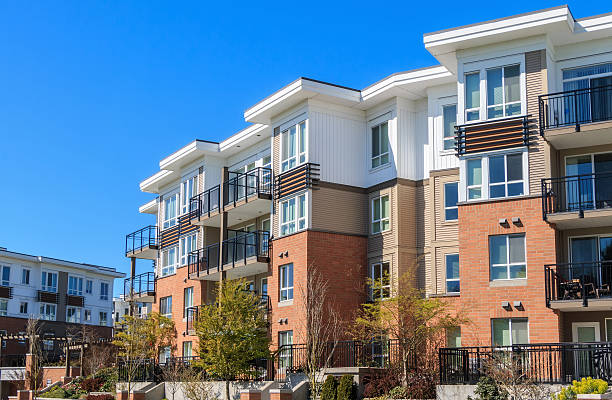Table of Content
▲
Condominiums, or condos, are on the rise as a common living choice in urban and suburban developments. Condos are unique with their combination of private property ownership and community-oriented features. They are a great living option for those looking for low-maintenance and affordable housing, whether for individuals, couples, or small families. This article will cover everything you need to know about condominiums, including the amenities offered, benefits and drawbacks, as well as considerations for each element for potential buyers.
What is a Condominium?
Condominiums are a type of ownership in which an individual owns a unit within a multi-unit building. The unit owner owns their unit as well as the common public amenities (such as corridors, elevators, gyms, and swimming pools), which are owned jointly by all unit owners. The common shared areas are collaboratively administered by all unit owners, and the unit owners pay a monthly fee to a homeowners' organization (HOA) for maintenance.
Condominiums differ from single-family homes because owners are part of shared amenities with the costs of the amenities and management shared among owners. Partial ownership costs, and reasonable shared monthly fees, make them appealing to first-time buyers, downsizers and urban occupants.
Also Read: Flat vs House: Which Is the Better Choice for Homebuyers?
Key Features of Condominiums
1. Private Unit Ownership
Condominium owners have complete control over their units. They can personalize their living space, sell, or rent the property in accordance with HOA rules.
2. Shared Amenities
Most condominiums provide shared amenities such as swimming pools, exercise centers, parking lots, and gardens. These features improve inhabitants' quality of life without needing individual upkeep.
3. Community Living
Living in a condominium usually entails being part of a larger community. While this promotes a sense of belonging, it also entails adhering to HOA rules and regulations.
4. HOA Management
The HOA is in charge of common-area care such as landscaping, cleaning, and repairs. These events are sponsored by HOA fees, which vary according to the property's location and amenities.
5. Security
Many condominiums include increased security features such as CCTV surveillance, gated gates, and 24-hour security guards to ensure the protection of residents.

Benefits of Living in a Condominium
1. Affordability
Condominiums are often less expensive than single-family homes in the same area. They offer the possibility to own property without incurring the hefty costs connected with keeping an independent house.
2. Access to Amenities
Residents have access to high-end amenities like as gyms, swimming pools, and clubhouses, which would not be affordable in a standalone residence.
3. Low maintenance.
The HOA handles external maintenance such as cleaning, gardening, and repairs, freeing homeowners of additional chores.
4. Location Advantages:
Condominiums are typically placed in desirable metropolitan neighborhoods, close to businesses, schools, shopping malls, and public transportation.
5. Condominiums Engagement
Condominiums promote social contact and a sense of community among inhabitants.
Challenges of Living in a Condominium
1. HOA Fees
Regular HOA fees are mandatory and can increase over time. Additionally, special assessments might be levied for significant repairs or upgrades.
2. Limited Privacy
Shared walls, common spaces, and proximity to neighbors can reduce privacy, which might not suit everyone.
3. HOA Rules and Restrictions
The HOA may impose restrictions on property use, renovations, and rentals. Non-compliance can lead to penalties or legal disputes.
4. Resale Value Uncertainty
The resale value of a condominium may be influenced by the HOA’s management, neighborhood trends, and market conditions.
5. Potential Conflicts
Disagreements with HOA management or neighbors can lead to disputes, affecting the living experience.
Also Read: Discover the Affordable Areas to Live in Mumbai
How to Choose the Right Condominium
Selecting the right condominium requires careful consideration of your personal needs, financial situation, and future goals. Here are some key tips:
1. Evaluate the HOA
Review the HOA’s rules, financial health, and past performance. A well-managed HOA ensures smooth operations and minimal disputes.
2. Inspect the Property
Assess the condition of the individual unit and shared amenities. Pay attention to maintenance quality and potential repair needs.
3. Analyze HOA Fees
Ensure the monthly fees fit your budget. Check for any pending assessments or potential increases in the near future.
4. Consider Location
Prioritize condominiums in well-connected areas close to your workplace, schools, and other essential facilities.
5. Resale Potential
Research market trends and demand for condominiums in the area to gauge future resale value.

Types of Condominiums
1. High-Rise Condominiums
Found in urban centers, these buildings offer stunning views, advanced amenities, and proximity to city attractions.
2. Low-Rise Condominiums
Ideal for those seeking a quieter living experience, these properties are usually located in suburban areas.
3. Detached Condominiums
These resemble standalone houses but are part of a larger community with shared amenities.
4. Townhouse-Style Condominiums
These units often include multiple levels, providing a spacious living experience similar to a traditional townhouse.
5. Luxury Condominiums
Designed for affluent buyers, these properties offer premium amenities, high-end interiors, and prime locations.
Tips for First-Time Condominium Buyers
1. Set a Budget
Determine your budget, including the purchase price, HOA fees, and maintenance costs.
2. Hire a Real Estate Agent
Work with an agent experienced in condominiums to find the best options within your budget.
3. Read the Fine Print
Carefully review the HOA’s governing documents, including rules, fees, and dispute resolution processes.
4. Understand Financing Options
Research loan options tailored to condominiums and compare interest rates before finalizing your mortgage.
5. Visit Multiple Properties
Explore various condominiums to compare features, pricing, and community dynamics before making a decision.
Future of Condominiums
Urbanization likely has a growing impact on housing, and condominiums are a significant piece of modern housing. There is much on the horizon in terms of design innovations, sustainable living, and smart home technologies that will continue to make condos attractive options. Developers with an eye to the future are working to create green or eco-conscious living spaces, as well as community-centric spaces. This is a response to changing urban lifestyles.
Also Read: Flats vs Apartments: Understanding the Essential Differences
Conclusion
Condos are a fantastic choice for many consumers because they mix accessibility, affordability, and community living. Prospective purchasers can make well-informed decisions when they take into account the distinctive features of condos, including their benefits and drawbacks. Condos provide a range of lifestyles and price points, regardless of the buyer's level of experience.
To guarantee a profitable investment, if you're thinking about buying a condominium, take the time to assess your priorities, look into a variety of possibilities, and speak with experts.
Follow AquireAcers Whatsapp Channel to Stay Updated With The Latest Real Estate News









_1770286619.webp)
Ans 1. A condominium is a type of property where individuals own a specific unit in a multi-unit building while sharing ownership of common areas such as hallways, gyms, and swimming pools.
Ans 2. In a condominium, you own the unit and share ownership of common spaces with other residents, whereas an apartment is typically rented, and you don’t own any part of the property.
Ans 3. HOA (Homeowners' Association) fees are monthly charges paid by condominium owners to maintain shared amenities and common areas. These fees cover expenses like landscaping, security, and building maintenance.
Ans 4. Common amenities include swimming pools, gyms, clubhouses, parking spaces, gardens, and sometimes even concierge services or recreational areas.
Ans 5. Condominiums offer affordability, low maintenance, access to amenities, prime locations, and a sense of community living.
Ans 6. Challenges include mandatory HOA fees, limited privacy, adherence to HOA rules, potential conflicts with neighbors or the HOA, and uncertain resale values.
Ans 7. Consider factors such as location, HOA rules and fees, the condition of the property, resale potential, and your personal budget and needs.
Ans 8. Yes, condominiums can be suitable for small families, especially those with access to family-friendly amenities and good security.
Ans 9. Assess the unit’s condition, shared amenities, maintenance quality, and the HOA’s management and financial stability.
Ans 10. Future trends include sustainable and eco-friendly designs, smart home technology integration, and community-focused living spaces to meet the needs of modern urban lifestyles.